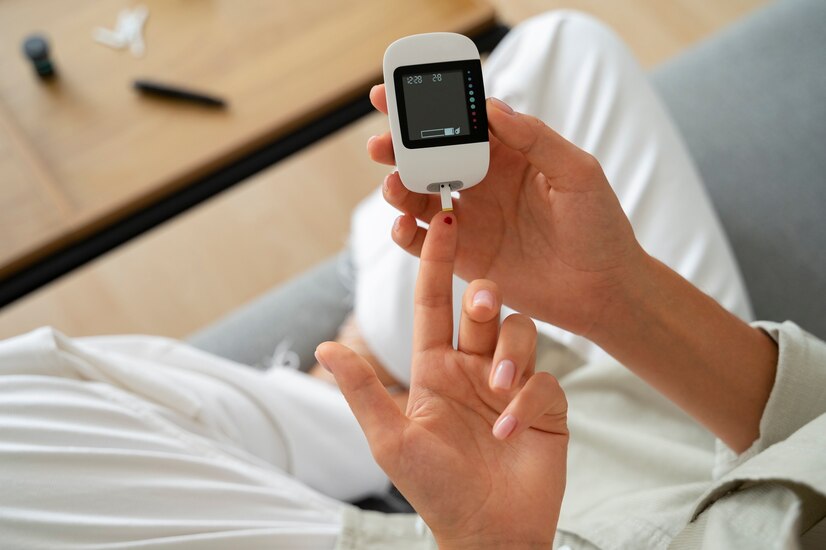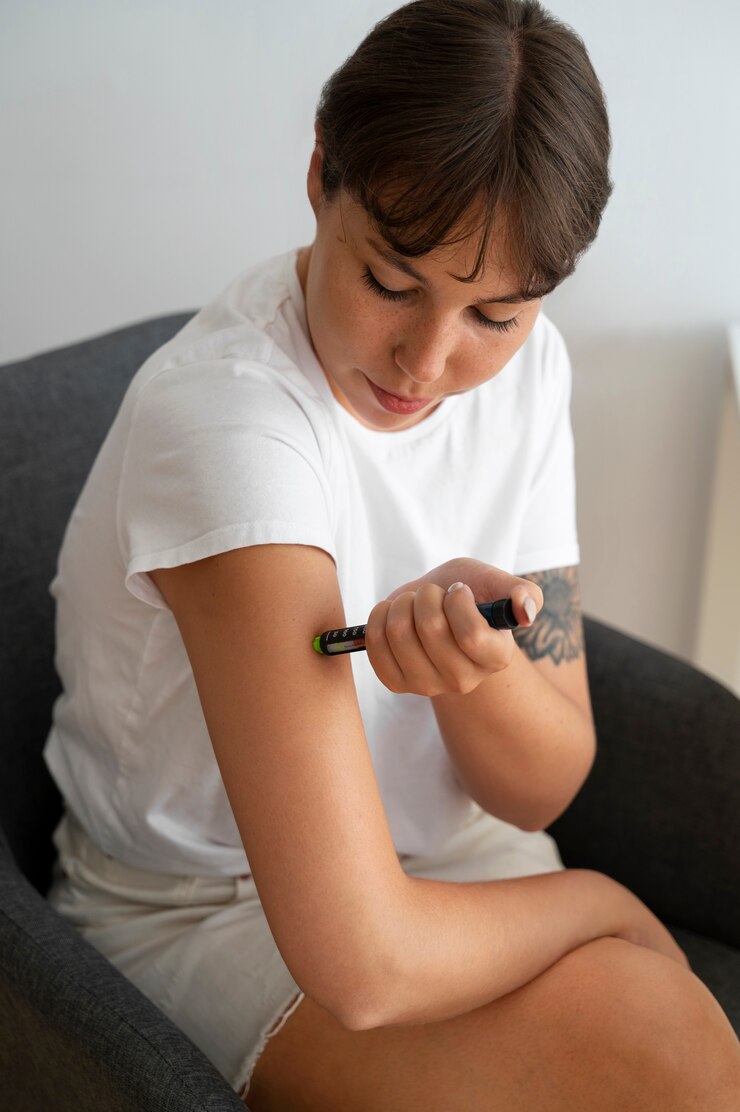
Diabetes is a health issue impacting a growing number of children and teenagers, making it essential for parents to recognize its signs early. The National Diabetes Statistics Report reveals approximately 210,000 children under 20 in the U.S. have been diagnosed with diabetes, predominantly type 1, in 2020.
Early intervention by a primary care doctor in Bridgeport, CT, can mitigate the higher risk of these health challenges.
Diabetes is a chronic condition that affects how the body processes food into energy, often leading to elevated blood sugar levels. Glucose, derived from food, is the body’s primary energy source. Insulin, a hormone produced by the pancreas, facilitates the entry of glucose into cells for energy utilization.
Excess glucose remains in your bloodstream when your body either doesn’t make enough insulin or can’t effectively use it. Prolonged high blood sugar levels can result in serious health complications, including heart disease, vision problems, and kidney disease.
Conducting regular check-ups with your primary care doctor in Bridgeport, CT, is a must. They can guide lifestyle changes, medication management, and preventive measures to help you maintain your health and well-being.

There are three main types of diabetes: type 1, type 2, and gestational diabetes. Type 1 diabetes is caused by an autoimmune response that impairs insulin production, while type 2 diabetes occurs when the body struggles to use insulin properly, leading to abnormal blood sugar levels.
Diabetes is a prevalent health issue affecting individuals of all ages, including children and adolescents. A primary care doctor in Bridgeport, CT, must comprehend the impact of diabetes on youth and develop tailored interventions that promote their long-term health and well-being.
Type 1 diabetes, commonly referred to as juvenile diabetes, is an autoimmune disorder where the immune system erroneously targets and destroys insulin-producing beta cells in the pancreas. This leads to a crucial deficiency of insulin, a hormone vital for controlling blood glucose levels. It is the most common type of diabetes among children and young people, making up 5-10% of all diabetes cases.
According to the Centers for Disease Control and Prevention (CDC), 38.4 million people have diabetes (11.6% of the US population). Critical characteristics of Type 1 diabetes include a dependence on insulin therapy, increased risks of severe hypoglycemia and diabetic ketoacidosis (DKA), a genetic predisposition, and a strong association with specific autoantibodies.
Type 2 diabetes, once known as adult-onset diabetes, is characterized by insulin resistance and elevated blood sugar levels. This metabolic disorder occurs when the body’s cells become less responsive to insulin. Increasingly prevalent among younger populations, Type 2 diabetes is closely linked to rising obesity rates and inactive lifestyles.
If you’re concerned about Type 2 diabetes for yourself or your child, consulting a primary care doctor in Bridgeport, CT, is advisable. They can guide prevention strategies, lifestyle modifications, and appropriate management options tailored to your needs and circumstances.
Diabetes can have profound long-term effects on children, impacting various aspects of their health. Complications may manifest as heart disease, kidney problems, nerve issues, eye and foot problems, skin, mouth, bone, joint, and hearing issues. It’s vital to effectively manage diabetes and detect it early to mitigate these risks and enhance the quality of life for affected children. Regular monitoring and treatment adjustments, overseen by a trusted primary care doctor in Bridgeport, CT, are essential for optimal care.
Aspect | Type 1 Diabetes | Type 2 Diabetes |
Onset | Typically sudden | Gradual |
Age of Onset | Usually in children and teenagers | More common in older children and teenagers |
Causes | An autoimmune reaction where the body attacks insulin-producing cells in the pancreas | Often associated with obesity, genetic factors, and insulin resistance |
Body Type | Often thin or average weight before diagnosis | Often overweight or obese |
Insulin Dependence | Immediate insulin dependence | It may be managed with diet, exercise, and medication initially; insulin might be required later. |

Diabetes in children can manifest in various ways. Recognizing the signs and symptoms early is essential to ensure proper diagnosis and management with a primary care doctor in Bridgeport, CT.
Here are the nine signs parents and caregivers should be aware of:
One of the earliest and most noticeable signs of diabetes in children is an unusual increase in both thirst and the frequency of urination. This occurs as the body attempts to eliminate excess glucose through the urine, pulling fluids from tissues and causing dehydration. As a result, the child may feel an intense and persistent thirst, leading them to drink more fluids than usual. Subsequently, this increases the need to urinate more frequently, often noticeable when it disrupts their routine, such as needing to go to the bathroom throughout the night.
If you observe these symptoms persistently in your child, it’s advisable to discuss them with your primary care doctor in Bridgeport, CT. The doctor can conduct or recommend appropriate tests to diagnose the underlying cause, such as diabetes.
Despite consuming more food, children with diabetes may continue to feel hungry. This relentless hunger occurs because the body’s cells aren’t receiving the glucose they need for energy, due to insufficient insulin. The child’s body then signals for more food as it tries to obtain the energy it lacks.
Similarly, unexpected Weight loss, especially in a child who is eating well or even eating more than usual, can be a sign of diabetes. This weight loss happens because, without enough insulin, the body cannot use glucose for energy and begins to break down fat and muscle instead.
Excessive tiredness and weakness in children that aren’t relieved by rest can indicate diabetes. When the body’s cells don’t receive enough glucose, they lack the energy to function optimally. This results in a persistent feeling of fatigue, which can affect the child’s daily activities and school performance. If your child is consistently fatigued and displays other signs of diabetes, a consultation with your primary care doctor in Bridgeport, CT, can help determine the cause.
Children with diabetes may exhibit unusual irritability and mood swings. These changes can stem from glucose fluctuations in the bloodstream, affecting overall mental state and emotional regulation. Parents might notice their child becoming unusually moody or temperamental. Regular monitoring and discussions with a primary care doctor in Bridgeport, CT, can help manage these symptoms if they are related to diabetes.
A sweet or fruity odor on a child’s breath is a distinctive sign of diabetes, especially Type 1. This odor is due to the presence of ketones, which are produced when the body begins to burn fat for energy because it cannot properly use glucose. This condition, known as ketoacidosis, is serious and requires immediate medical attention. If you detect a fruity scent in your child’s breath, seek advice from your primary care doctor in Bridgeport, CT, promptly.
Blurry vision in children can be a symptom of diabetes. High blood sugar levels can cause the body to pull fluid from tissues, including the lenses of the eyes, affecting the ability to focus clearly. These vision changes can fluctuate with varying blood sugar levels. If your child complains of difficulties in seeing clearly, it’s essential to schedule an appointment with your primary care doctor in Bridgeport, CT, who can determine if diabetes is a factor.
Girls with diabetes may be more prone to yeast infections. High levels of glucose in the blood and urine create an environment conducive to the growth of yeast. Frequent infections can indicate diabetes, especially if other symptoms are also present. If your daughter is suffering from recurrent infections, discuss this with your primary care doctor in Bridgeport, CT, as it could be indicative of diabetes.
If cuts, scrapes, or bruises on a child heal unusually slowly, it could be a sign of diabetes. Elevated blood sugar levels can impair blood flow and cause nerve damage, slowing the body’s natural healing processes. If you notice that your child’s sores or cuts are not healing as quickly as expected, it is advisable to consult with your primary care doctor in Bridgeport, CT. This could be a sign of diabetes and may require further tests.
In some cases, particularly in children at risk for Type 2 diabetes, dark, velvety patches may appear in the folds of the skin, such as around the neck or armpits. This condition, known as acanthosis nigricans, is linked to insulin resistance, which is a hallmark of Type 2 diabetes. Observing any combination of these symptoms in a child should prompt a consultation with a healthcare provider for further evaluation and possible diagnostic testing. Recognizing these signs early can help manage the condition effectively and prevent complications.

Educating your child about diabetes management is crucial for their overall health. Consulting with a primary care doctor in Bridgeport, CT, can provide valuable guidance and support tailored to your child’s needs.
Parents should learn as much as possible about diabetes and their child’s care plan, including how to check their blood sugar levels, administer insulin, and follow the meal plan. The more you know, the better equipped you will be to help your child manage their diabetes. Your primary care doctor in Bridgeport, CT, can provide valuable information and resources to support your child’s diabetes management journey.
A healthy meal plan is essential for managing diabetes. Parents should work with their child’s healthcare provider, including their primary care doctor in Bridgeport, CT, to create a meal plan that fits their child’s needs and preferences. Their healthcare team recommends that your child eat healthy foods, including fruits, vegetables, whole grains, lean proteins, and healthy fats.
Regular exercise is essential for managing diabetes. Parents should encourage their children to participate in physical activities they enjoy, such as swimming, biking, or playing sports. Exercise helps lower blood sugar levels and keeps kids fit. Your primary care doctor in Bridgeport, CT, can offer guidance on safe and appropriate exercise routines for your child with diabetes.
Parents should teach their children to regularly check their blood sugar levels using a glucose meter or continuous glucose monitor (CGM). This will help you and your child keep track of their blood sugar levels and adjust their care plan as needed. Your primary care doctor in Bridgeport, CT, can provide instructions on monitoring blood sugar levels effectively and interpreting the results.
Parents should learn how to administer insulin and adjust the dosage if their child requires insulin therapy. Your child’s healthcare provider, including your primary care doctor in Bridgeport, CT, will teach you how to do this safely and effectively.
Managing diabetes in school and during extracurricular activities requires careful planning. Parents should work with the school’s health services and ensure all personnel are informed about the child’s condition. A care plan developed in collaboration with the primary care doctor in Bridgeport, CT, should be shared with school staff, outlining how to handle blood sugar testing, meals, and any potential emergencies.
Children with diabetes need regular health checks to monitor their condition and prevent complications. These checks often include blood sugar level reviews, A1C tests, cholesterol tests, kidney function tests, and eye exams. The primary care doctor in Bridgeport, CT, will schedule these appointments and may refer the child to specialists if necessary, ensuring all aspects of the child’s health are monitored.
Families of children with diabetes can access various support services, including diabetes education programs, support groups, and counseling services. Additionally, a primary care doctor in Bridgeport, CT, often collaborates with pediatric endocrinologists and diabetes educators to provide comprehensive care and support for children with diabetes and their families.
In a diabetic emergency, such as hypoglycemia (low blood sugar) or diabetic ketoacidosis (high blood sugar), immediate action is required. Families should follow the emergency plan provided by their primary care doctor in Bridgeport, CT, which typically includes administering emergency treatments like glucose gels or injections and seeking medical help promptly.
Puberty can significantly impact diabetes management due to hormonal changes that affect blood sugar levels. It’s important to work closely with your primary care doctor in Bridgeport, CT, during this time. They will help adjust insulin dosage and dietary recommendations to cope with the changes and maintain reasonable diabetes control.
Educating your child on managing their diabetes effectively is essential for improving their long-term health and quality of life. For parents looking for the best primary care doctor in Bridgeport, CT, visit DOCS Primary Care – Bridgeport today. With us, your kids will be cared for by professionally trained healthcare providers and board-certified physicians at all locations. Schedule your appointment today!



During this surge in COVID-19 cases, our primary focus is meeting the high demand for tests, and we are seeing higher than usual wait times. This means we are unable to answer most phone calls. Please know that our teams are working very hard during this time to care for as many patients as safely as possible. Please click the button below for answers to common questions. We appreciate your understanding.